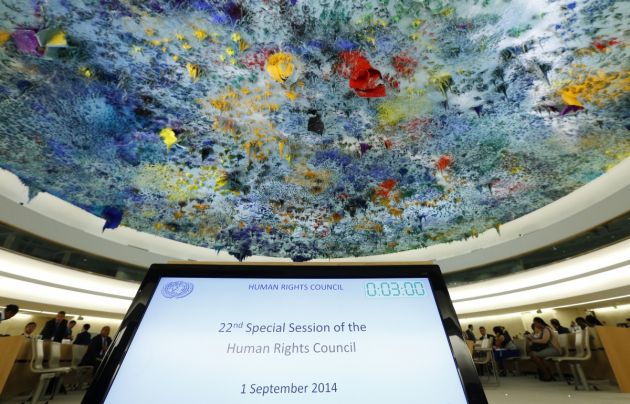Christian groups put their case strongly at UN Iraq hearing

Christian groups and other faith were out in force to support a U.N. Human Rights Council resolution to urgently explore abuses of international law in Iraq committed by the Islamic State and associated terrorist groups.
Archbishop Silvano Tomasi, the Vatican representative to the United Nations in Geneva told Vatican Radio he believed the meeting came as direct consequence of Pope Francis' letter to U.N. Secretary General Ban Ki-moon.
The letter was regarding the need to take action to protect those persecuted by IS terrorists.
Archbishop Tomasi said Pope Francis's appeal had an impact, and was effective in that it really spurred the international community to move.
In his address to the rights' council Tomasi said, "In several regions of the world there are centers of violence - Northern Iraq in particular - that challenge the local and international communities to renew their efforts in the pursuit of peace."
He said, "All regional and international actors must explicitly condemn the brutal, barbaric and uncivilized behavior of the criminal groups fighting in Eastern Syria and Northern Iraq."
Peter Prove, the World Council of Churches director for international affairs, who led the delegation in Iraq, said, "We were able to speak to and take testimony from a large number of people displaced from Mosul, the Nineveh Plain and other places now under the control of the IS.
"Their stories tell of the Islamic State's inhumanly brutal, violent, coercive and repressive efforts to eliminate any and all diversity in society in the region."
After the September 1 U.N. debate Prove stressed the need for a "clear international commitment to maintaining and protecting religious diversity in Iraq."
The WCC said in a September 2 statement, ""Neutralizing the aggressive military capacity of IS, and rooting out its poisonous ideology, should be of utmost importance to the entire international community, but especially to our brothers, sisters and friends in Islam, in whose name IS commits its atrocities."
The statement also urged an "end to the culture of impunity in Iraq and in the whole region" while suggesting a special tribunal for war crimes and crimes against humanity in Iraq and Syria.
ACT ALLIANCE
The Christian humanitarian aid agency, ACT Alliance, welcomed the U.N. resolution.
The resolution was made at a special session on Iraq, in Geneva, ACT Alliance and many faith-based organizations presented statements to the Human Rights Council.
ACT called for crimes to be investigated and those responsible held strictly accountable by the Government of Iraq and the international community.
The alliance also called for a stop to the direct financing of the Islamic State and the purchase of resources from areas under its control, saying these would be used to finance terror activities.
"The human rights and humanitarian situation in Iraq continues to escalate, with horrific violations of human rights and international humanitarian law, some of which might amount to war crimes and crimes against humanity," ACT Alliance general secretary John Nduna said.
"Summary executions of clerics, unabated destruction of cultural monuments, historical sites and archaeological sites, burning of crucial manuscripts targeting specific ethnic and religious groups such as Christians and Yazidis are ongoing and must stop," he said.
"The right to freedom of religion and worship must be respected and Iraq has to return to its multi-religious context in which religions can co-exist peacefully."
ACT Alliance, which provides humanitarian aid to displaced communities in Iraq, also called for the full implementation of U.N. Security Council resolution 2170.
This condemns the violence in Iraq, and aims to mobilize more life-saving aid as part of the humanitarian response.
The following non-governmental organizations also spoke at the U.N. meeting in Geneva: Minority Rights Group International, International Federation for Human Rights League, World Evangelical Alliance, International Confederation of Catholic Charities (Caritas Internationalis), Maarij Foundation for Peace and Development, International Institute for Peace, Justice and Human Rights, Syriac Universal Alliance, Lutheran World Federation in a joint statement, Union of Arab Jurists in a joint statement, Civicus – World Alliance for Citizen Participation, Islamic Human Rights Commission, Al-Hakim Foundation, African Commission on Human and Peoples' Rights, United Nations Watch, Commission of the Churches on International Affairs of the World Council of Churches, Al-Khoei Foundation, Indian Council of South America.